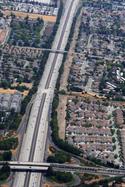President Barack Obama has rightly spoken positively about the American Dream, how it is becoming more expensive and how it needs to be reclaimed. But to do this, he may have to disregard many of those who have been among his strongest supporters and the dense urban centers which have been his strongest bastion of support. read more »
Transportation
How Detroit Lost the Millennials, and Maybe the Rest of Us, Too
The current debate over whether to save our domestic auto industry has revealed some starkly different views about the future of manufacturing in America among economists, elected officials, and corporate executives. There are many disagreements about solutions to the Big Three’s current financial difficulties, but the more fundamental debate lies in whether the industry should be bent to the will of the government’s environmental priorities or if it should serve only the needs of the companies’ customers and their shareholders.
But there’s something more at stake: the long-term credibility of Detroit among the rising generation of Millennials. These young people, after all, are the future consumers for the auto industry and winning them – or at least a significant portion of them – over is critical to the industry’s long-term prospects in the marketplace and in the halls of Congress. read more »
The Importance of Productivity in National Transportation Policy
For years, transit funding advocates have claimed that national policy favors highways over transit. Consistent with that view, Congressman James Oberstar, chairman of the powerful House Transportation and Infrastructure Committee, wants to change the funding mix. He is looking for 40 percent of the transportation funding from the proposed stimulus package to be spent on transit, which is a substantial increase from present levels.
This raises two important questions: The first question is that of “equity” – “what would be the appropriate level to spend on transit?” The second question relates to “productivity” – “what would be the effect of spending more on transit?” read more »
Make Sure All That Infrastructure Spending Is Well Supported
It's the new buzzword: infrastructure.
President-elect Barack Obama has promised billions in infrastructure spending as part of a public works program bigger than any since the interstate highway system was built in the 1950s. Though it was greeted with hosannas, his proposal is only tapping into a clamor for such spending that's been rising ever since Hurricane Katrina hit New Orleans in 2005 and a major bridge collapsed in Minneapolis last year. With the economy now officially in recession, the rage for new brick and mortar is reaching a fever pitch.
But before we commit hundreds of billions to new construction projects, we should focus on just what kind of infrastructure investment we should – and shouldn't – be making. read more »
How About a Rural Stimulus?
In Pennsylvania, public and private funds mainly are directed into areas where people live and where people vote. As a result urban Pennsylvania has significant advantages over rural communities in securing public funds and private investment. read more »
- Login to post comments
China Should Send Western Planners Home
For centuries, the West sent missionaries around the world to spread various gospels. It is no different now, though the clerics tend to hold degrees from planning schools rather than those overtly specializing in theology.
This could also create tragic results as ideologies created in one context are imported into a totally foreign one. read more »
City Planning and The Politics of Pollution
Part Two. Yesterday, in Part One, Critser discussed scientific advances in understanding air pollution. Today, he addresses the social implications.
The new science of air pollution, with its emphasis on dose-response mechanisms, may remake the traditional advocacy realm of social and environmental justice. In the past, that world has been focused on class, race and ethnicity, classic markers of inequality and vulnerability. Today, the focus is more “exposure driven.” “Dosage… may be something people who have ignored environmental justice can get their heads around,” one researcher at last month’s Environmental Epidemiology conference in Pasadena noted. “It may get people’s attention on something that affects us all.” read more »
Will The New Air Pollution Science Choke City Planners?
Part One of A Two-Part Series
Not long ago, Michael Woo, a former Los Angeles city councilman and current member of the Los Angeles City Planning Commission, took up a case pending approval by that body: a mixed housing-retail development near the intersection of Cahuenga Boulevard and Riverside Drive. Like many of the remaining buildable sites in the city, the property is right next to a roaring motorway; the windows of some apartments would look right out onto the 134 Freeway. To Angelinos, who have grown up in a car culture, it was hardly a remarkable proposal. But Woo, perhaps one of the brainier members of the city’s political elite—after losing a mayoral race to Richard Riordan in the early 1990s he became a professor of public policy at University of Southern California—had a problem with it, and he couldn’t quite let it go. read more »
L.A.’s Big-Bucks Plan for Upper Floors on Broadway Overlooks Facts at Ground Level
City officials and private business owners recently gathered to celebrate the extended holiday hours of the Metropolitan Transportation Authority (MTA) Metro Red Line train service between Hollywood and Downtown. Private businesses put up $50,000 or so to pay for the Red Line to run an extra two hours — until 3 a.m. — on weekends through December 27. The local business community also came up with private funds for free service on city-operated DASH buses that will offer connections to late-night Red Line riders and others. read more »
From Rhetoric to Reality on Transit
Rhetoric always seems to trump reality in the headline department. This has been evident as a fawning press and commentators have made the most of the decline in driving from high gas prices and the related increase in transit ridership. As gas prices rose to their above $4.00 peak, driving in the nation’s urban areas had declined 2.0 percent over a year. At the same time, transit ridership rose 3.3 percent, leading to the impression that transit ridership increases had accounted for most, if not more than the loss in driving. read more »






















